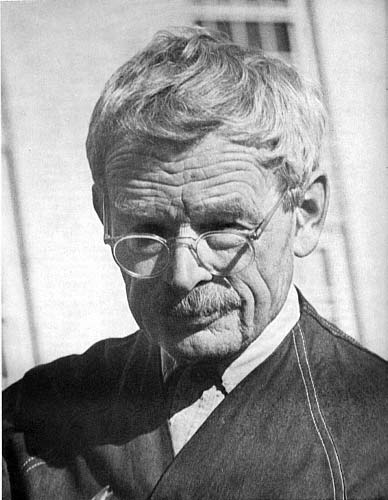John Bacher: 1883-1961
Dean Collins

|
|
Fig. 18. John Bacher
1883-1961 |
The American Rhododendron Society, along with many other horticultural societies in the Northwest, lost one of the most distinguished "plant pioneers" of the Northwest, when John G. Bather died, January 19, after having played an outstanding role in the horticultural "revolution" that was triggered in Portland in 1905 by the Lewis & Clark Centennial.
John Bacher arrived in the United States in 1903, spent brief periods in Philadelphia and St. Louis, and then in 1905 came to Portland because of the interest in the Centennial, having already taken in the centennial held in St. Louis a couple of years before.
Portland seemed to him the proper place for a graduate of the National School of Horticulture of Geneva, Switzerland to settle, and he opened the Swiss Floral Company nursery and greenhouse activity in 1906, which he operated until 1958, when he retired.
Following the Lewis & Clark Centennial there was a real estate boom in Portland, due to the influx of people whose interest had been aroused by visiting the Northwest and attending the Centennial. New sub-divisions began developing rapidly on what had been sparsely settled areas or even farm land on the East Side. This created a rising demand for landscaping and planting and John Bather was the vanguard in this authority. A great number of prominent nurserymen, landscapers, greenhouse men and landscape architects active today in Portland and elsewhere, got their preliminary training in Bather's crews of workmen. Many of his "graduates" have also contributed notably to the development of Portland in this field in the intervening years.
At the time of his arrival Portland had reached the culmination of the "Victorian era" in landscaping and garden planting. He began introducing newer and more modern materials and methods. Today in almost every part of the city and elsewhere in the Oregon country, things that he pioneered in introducing have become characteristic of our landscape patterns.
Fuchsias, camellias, and innumerable other materials got their earlier introductions at his hands. In hybridizing also he was active and introduced a number of new named varieties, among which are R. 'Bacher's Gold' now on the market, R. 'Geneva', and R. 'Berne', not yet on the market.
He was active as one of the founding members of the American Rhododendron Society. In his later years he taught horticulture in the adult education department of the Portland Public School System until he was retired from this at the age of 65.
He was a contributor to the Society Bulletin and did many other articles for various publications, besides lecturing before many garden clubs and other organizations.
Oregon Federation of Garden clubs gave him one of their citations for outstanding service to horticulture, and the Men's Garden Clubs of America gave him the Johnny Appleseed award, their highest honor. Charter membership and various honors have been given him in the American Rhododendron Society, Landscape Gardener's Association, Oregon Association of Nurserymen, Portland Men's Garden club, Oregon Camellia Society, Oregon Fuchsia Society, Portland Chrysanthemum Society, Portland Orchid Society and Oregon Primrose Society.